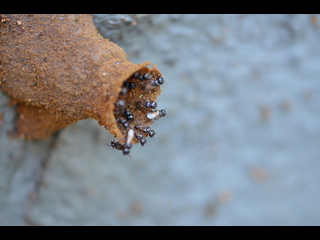Outcomes of LSJ Projects
Listed below are shining examples of projects by talented researchers and innovators that have been awarded Liv Sidse Jansen Memorial Foundation funding.
Read below about the projects we have supported and what they found:
Title: Colony defence in a host-parasite system in Neotropical stingless bees
Investigators: Dr Christoph Grueter
Award: £2,290

Application summary: Stingless bees are the most diverse group of social bees and the most abundant pollinators in the tropics. One of the main threats to stingless bees are cleptoparasitic robber bees, which frequently raid nests and kill the attacked colonies. Despite their lack of a sting, stingless bees are not defenceless. One effective adaptation are so-called soldier bees, i.e. nest entrance guards that are larger and stronger than their nestmates. The first soldier bees were discovered in the common Neotropical species Tetragonisca angustula. The entrance guards of T. angustula aggressively attack robber bees that attempt to enter their colony, often recruiting dozens or hundreds of nestmates to fight against the robbers. Such a large-scale defensive response could impact the foraging activity of colonies and lower the colony foraging success of attacked colonies. This host-parasite system provides an excellent opportunity to quantify the costs and benefits of colony defence in an ecologically and culturally important bee species. This project had three aims. First, we studied (Aim 1) if robber bee attacks depend on the number of entrance guardsin T. angustula colonies and (Aim 2) assessed whether an increase in guard number has a negative impact on foraging performance of host colonies. It also allowed us to (Aim 3) re-establish a collaboration with the University of Sao Paulo which has been interrupted because of the pandemic. The results of the project will build a foundation for a future research program to study co-evolution of a tropical host-parasite system under natural conditions.
Project Outcomes:
-
We collected a large amount of data on colony sizes, defensive investment and outcomes of robber bee attacks. This data was collected by a Bristol MRes student (Luís Carvalho), who is currently analysing the data. He aims to write up his work for a publication.
-
We strengthened and extended our cooperation with our partners in Brazil at the University of São Paulo. We met new members of the team of Prof. Fabio Nascimento, some of which are now involved in this project.
-
We made some exciting, novel observations on the interactions between robber bees and their host colonies, which will form the basis for grant applications targeting the Leverhulme Trust and the EU’s Marie Skłodowska-Curie Actions (2024 round).
-
We gave presentations during a research seminar at our host institution.
